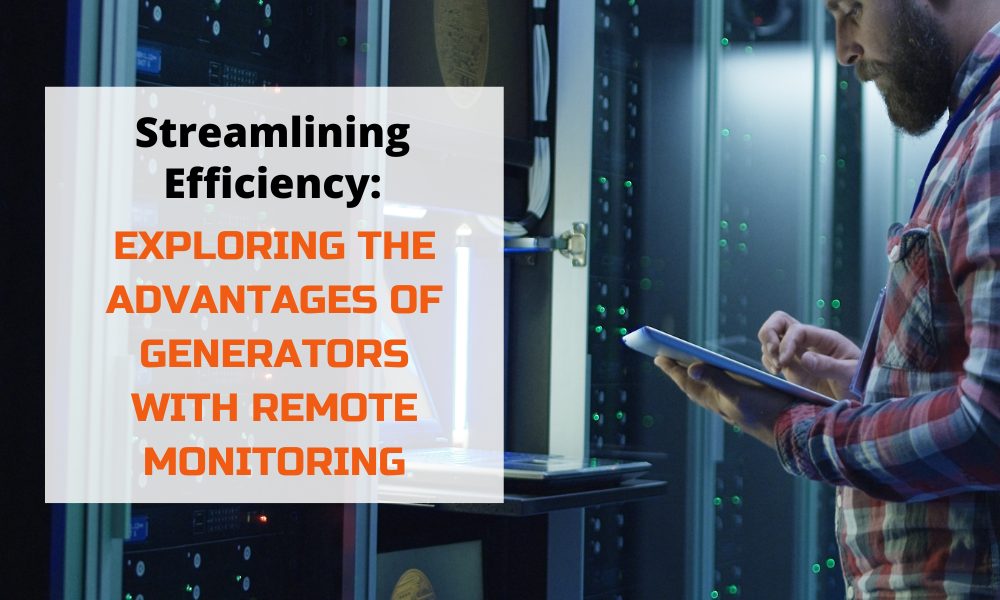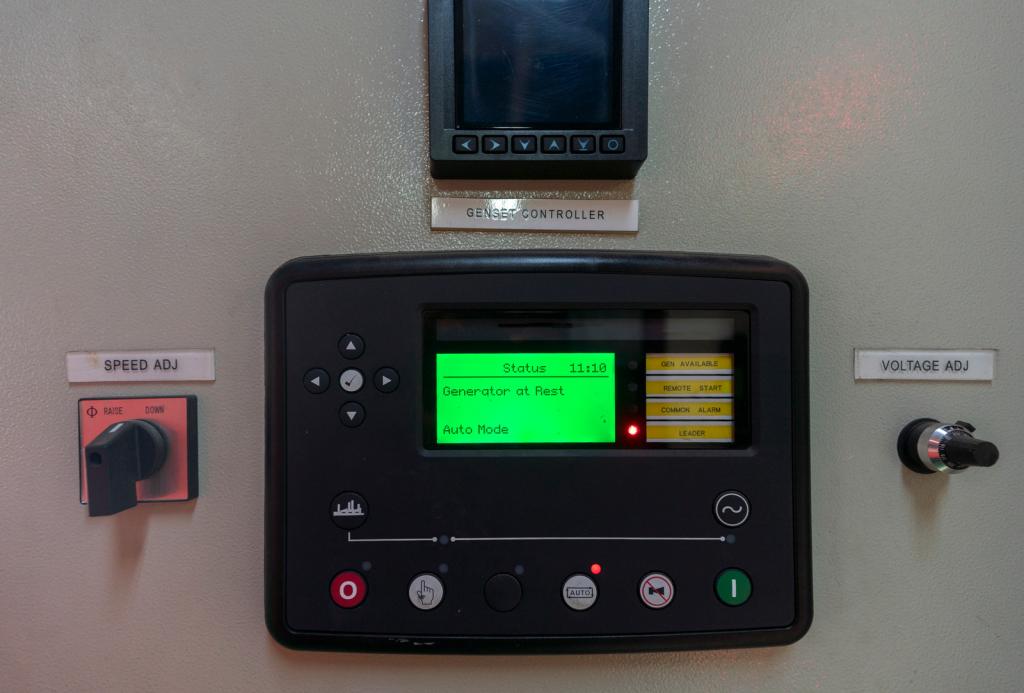In sectors where uninterrupted power is critical—such as healthcare, data centres, construction, and manufacturing—generators play a vital role in providing reliable backup power. Ensuring these generators are ready to perform during emergencies is essential to prevent costly downtime. Remote monitoring systems are revolutionising generator management by allowing operators to monitor performance in real-time, anticipate maintenance needs, and optimise management—all without requiring on-site checks.
At GHASA, we understand the importance of efficient generator monitoring. In this article, we’ll dive into the key advantages of remote monitoring technology and why it has become indispensable for certain industries.
What Is Generator Remote Monitoring?
Generator remote monitoring involves using monitoring systems to track generator performance and status from afar. Using sensors and internet-connected devices, these monitoring systems can gather critical data on a generator’s functionality, fuel levels, battery status, and more, then relay this information to a central platform accessible from computers or mobile devices.
These remote generator management systems can provide real-time alerts, enable remote troubleshooting, and track performance metrics to ensure reliable operation. For businesses that rely on uninterrupted power, remote monitoring systems for generators can be transformative, offering insights that help optimise generator performance and streamline maintenance.
Key Benefits of Generator Remote Monitoring
Remote monitoring systems for generators offer powerful advantages, from proactive maintenance and optimised performance to enhanced reliability and safety. Here’s a closer look at how remote monitoring transforms generator management in industries where uninterrupted power is essential:
-
Proactive Maintenance and Reduced Downtime
One of the most significant advantages of generator monitoring is the ability to detect issues early. With generator performance tracking, operators can receive alerts about potential problems, such as low fuel levels, battery issues, or abnormal temperature readings. This enables proactive maintenance, allowing issues to be resolved before they result in generator failure or downtime.
Proactive maintenance not only reduces the likelihood of unexpected outages but also extends the generator’s lifespan by preventing extensive wear and tear. A generator monitoring system helps businesses avoid reactive repairs, which are often more costly and time-consuming than scheduled maintenance. -
Optimising Generator Performance for Cost Savings
Remote monitoring benefits extend beyond preventing breakdowns; it also allows businesses to optimise generator performance. By tracking fuel consumption, load levels, and operational hours, businesses can identify patterns that indicate inefficiencies. Adjusting generator settings or schedules based on these insights can lead to more efficient fuel use, translating into substantial cost savings over time.
Optimising generator performance is especially crucial in industries with high power demands, where generators run for extended periods. Small changes in generator operation, informed by data from a generator monitoring system, can accumulate to yield significant savings in operational expenses. -
Enhanced Reliability and Peace of Mind
The reliability of power sources is critical in emergency situations. With generator remote monitoring, operators have peace of mind knowing they can trust their equipment to perform when needed. Real-time alerts and notifications about generator status ensure that potential issues are flagged and addressed promptly, so businesses are always prepared for unexpected power interruptions.
A generator monitoring system that includes remote diagnostics capabilities can also allow technicians to troubleshoot problems remotely, potentially resolving issues without requiring a site visit. This enhanced reliability gives businesses confidence in their backup power solutions, which is especially valuable for mission-critical operations. -
Data-Driven Insights for Informed Decision-Making
Generator performance tracking provides data-driven insights that can guide future planning and decision-making. Remote monitoring systems collect and store detailed records of generator activity, including fuel usage, load data, and runtime hours. By analysing these trends, companies can make informed decisions about equipment upgrades, capacity requirements, and fuel procurement strategies.
For example, tracking fuel usage patterns might reveal that certain generators are underutilised, suggesting an opportunity to consolidate power resources and reduce operational costs. By harnessing the data provided by generator monitoring systems, businesses can optimise resources, allocate budgets more effectively, and enhance overall power management. -
Improved Safety Through Remote Monitoring
Safety is a top priority for any business, particularly those in industries with significant power needs. Remote generator management can play an important role in enhancing safety by reducing the need for frequent on-site inspections, which are often conducted in hazardous or hard-to-reach locations.
Remote monitoring systems also alert operators to potentially dangerous conditions, such as overheating or fuel leaks, so that they can respond quickly to mitigate risks. With a reliable monitoring system in place, businesses can ensure that employees are only deployed to check generators, when necessary, thereby minimising exposure to potentially unsafe conditions.
Applications of Generator Remote Monitoring in Key Industries
Generator remote monitoring offers significant advantages across various industries. Let’s examine how it supports the continuous operation of essential services in healthcare, construction, and data centres:
-
Healthcare Facilities
Hospitals and healthcare facilities require consistent power to operate life-saving equipment, making reliability a non-negotiable factor. Remote monitoring ensures that generators in healthcare settings are always ready to operate in case of an outage. Data from generator performance tracking allows facility managers to spot and address issues quickly, keeping essential systems operational.
-
Construction Sites
For remote or temporary construction sites where power is not easily accessible, generator remote monitoring provides the benefit of reducing the need for on-site technicians to regularly check power sources. With remote generator management, construction managers can monitor fuel levels and performance from afar, ensuring that operations continue without interruption.
-
Data Centres
Data centres rely on continuous, uninterrupted power to protect vast amounts of digital information. Even a brief outage can have catastrophic consequences. Generator monitoring systems help data centres maintain uptime by providing real-time insights into generator health, fuel status, and performance, enabling quick responses to any potential issues.
Overcoming Challenges in Generator Monitoring Systems
Implementing generator remote monitoring involves initial setup costs, and in some cases, training for personnel to use the monitoring software effectively. However, these initial investments are often offset by the long-term savings generated through reduced maintenance costs and optimised performance.
Additionally, some businesses may encounter connectivity challenges, especially in remote areas. However, advancements in satellite and mobile data technology have made it increasingly feasible to implement monitoring systems in even the most remote locations. The ability to monitor and manage generators remotely has become more reliable, ensuring that power needs are met consistently.
Future Trends in Remote Monitoring Technology
As technology advances, we can expect to see continued innovation in generator monitoring systems. Integrations with artificial intelligence (AI) and machine learning are expected to enhance data analysis, enabling predictive maintenance models that further minimise downtime and optimise performance.
Additionally, the integration of IoT (Internet of Things) technology means that remote monitoring systems are becoming increasingly compatible with other smart devices, allowing businesses to consolidate their power management systems on a single platform. These trends indicate that the benefits of remote generator management will only increase in the future, offering new ways to ensure operational efficiency and cost-effectiveness.
Unlock the Full Potential of Remote Generator Monitoring with GHASA
Generator remote monitoring is an invaluable tool that enhances efficiency, reliability, and safety across industries that rely on uninterrupted power. With proactive maintenance, performance optimisation, and the ability to make data-driven decisions, businesses can reduce downtime, extend generator lifespan, and improve cost-efficiency. As technology continues to advance, remote monitoring systems will only grow more powerful, enabling businesses to manage their power solutions more effectively than ever before.
At GHASA, we are committed to helping industries stay ahead with the latest in generator remote monitoring technology. If you’re looking to streamline your generator management and ensure reliable power at all times, contact us on (08) 9359 1988 to discuss how we can support your business.



